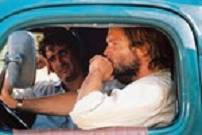|
|
||||
|
|
by Donald Levit  In the considerable wake of hyperhype, the art-house circuit has shrunk, but luckily museums, libraries and schools have picked up part of the slack to help deserving, usually distributor-less films find an audience. For instance, Cinema, Aspirin and Vultures/Cinema, aspirinas e urubus, is among eight full-lengths and five shorts at the Museum of Modern Art’s 2006, fourth Global Lens, conceived with the Global Film Institute to bolster the art in areas too underdeveloped to compete with others’ big budgets and technology. “Every person has a voice, every voice tells a story, and every story reveals a world.” With its director Karim Ainouz, Amazon Basin-born Marcelo Gomes cowrote the controversial 2002 Madame Satã, and now the former reverses by cowriting (and associate producing) with Gomes on this the latter’s feature. Lamentably, some have already labeled the ninety-nine minute effort a “Brazilian Western” and a “road movie,” unintentionally condemning it to the growing pile of forgettable wise-cracking male or female buddy-buddy fare. Yes, there are the two strangers who learn from, and grow to care for, each other, on the journey to a backwater aptly named Triunfo (Triumph), and thence theoretically on to Rio; and, of course, the noisy but dependable small van makes the expected stops on which to encounter quirky country folk. But the two men’s personalities, an out-of-the-ordinary setting and time, and simple camera techniques deftly used, bring this quiet piece above the pack. Blondish, unshaved, handsome Johann Hohenfels (Peter Ketnath) drives the miserable dirt roads of 1942 northeast One such vague hitchhiker is Ranulpho (João Miguel), who stays on for an assistant’s job, to learn to drive and run the projector, and finally to seek opportunity in the capital. With the many characters they briefly run into, sympathetic and spaced at intervals but not spacey -- drought-ruined farmers, crying then laughing easy women, small-town businessmen, hunters and housewives and whores -- the center remains these two, thematically of course but reinforced by brilliant close-up work in which background is either slightly unfocused or else either in blackness beyond candle- or firelight or so overexposed as to be bleached of color like the skies and ubiquitous stunted, twisted, leafless trees. Stage actors, Ketnath and Miguel bring dignity to their characters, who, though not consciously hiding anything, only gradually but with all naturalness reveal themselves. The German sought travel adventure working on shipboard but, “afraid of dying [and] not born to kill,” mainly wanted out of his country as war loomed inevitable. Shier with women, non-smoker Ranulpho fled the “five houses, a cross in the road” of Bonança (ironically, Bonanza), to find a future but expects little in what he sees as his misbegotten nation; nursing the other back from a near-fatal snake bite, he relates an (imagined) tale of discrimination against country boys like himself, many of whom are forced into the Amazon to supply rubber for North America’s war effort. The outside intrudes, as bulletins increasingly break into radio music. Hitler’s navy attacks off “Inspired by a story of the travels of Ranulpho Gomes,” Marcelo Gomes’ full-length début does not offer answers or imply the future. Wearing social consciousness differently from The Motorcycle Diaries and less, really, of a concrete time and place, it portrays always and everywhere in its complementary protagonists’ relationship and in the other vignetted lives whose paths they cross. (Released by Global Film Initiative; not rated by MPAA.) |
||
|
© 2026 - ReelTalk Movie Reviews Website designed by Dot Pitch Studios, LLC |



